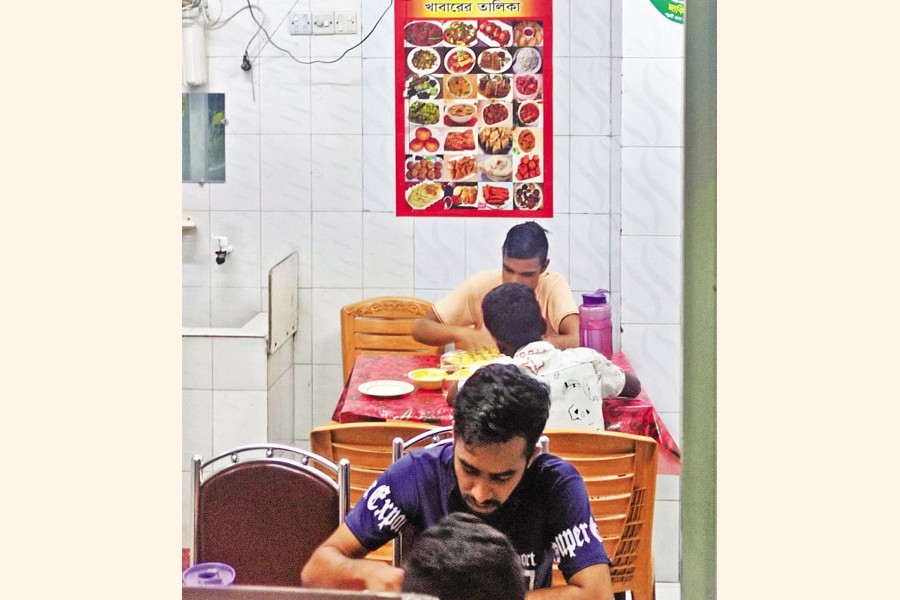Inflation has hit Bangladesh hard and nowhere is it felt more than in Dhaka. Food prices are skyrocketing, and perhaps the worst sufferers are the bachelors. They rely on hotels to get their meals, as few can cook themselves. And amidst the inflation, the hotel owners are reaping its benefit to the extent of absolute anarchy. The Financial Express has talked to three bachelors living alone in Dhaka and tried to portray the grim scenario of eatery business in Dhaka city.
Dr Humayun Kabir, MBBS, is the Project Research Physician in the Nutrition & Clinical Service Division of the icddr,b. He has been dining in Dhaka hotels since 2007. He has expressed concerns about the hotels doubling the prices of everyday meals.

"Now, people can not afford meat, eggs or fish," he said, "even sometimes I have to drop omelettes from my meals, and I am quite solvent. Imagine the plight of low-income people!"
The hotels have been serving stale foods since the pandemic, and they hide the foul taste or odour with heavy spices. He has shared another interesting observation, "I had a pizza from Pizza Hut two days ago, and surprisingly, its price has not increased since 2010. Yet, my rice and daal meal costs double now."
This trend has an adverse health aspect, explained Dr Humayun Kabir, as the price hike is compelling people to be dependent on carbohydrate-based meals, and drop protein from their menu altogether.
"People now have only bhaat with alu bhorta; basically, they have carbohydrates with carbohydrates. They can not afford meat, fish or eggs, causing protein deficiency. People used to have an omelette with paratha before, and it would satisfy their daily protein needs. But now, it is not possible anymore; an omelette costs 20-30 taka."
"This will create a diabetes epidemic in future. Our pancreas can not produce enough insulin to digest all these carbs that we are compelled to eat; soon, we will see many diabetic patients around us. Especially the bachelors living in Dhaka alone are the most vulnerable groups here," he further added.
Kais Mahmud Snigdho, a young poet, has expressed similar observations regarding the service of hotels.
"These days, all the hotels use too many spices and oil to hide the stale flavour of leftover curry. The size of chicken pieces has shrunk, and no curry or vegetable is given with fish dishes anymore. Two or three months ago, the food used to be better. Even when the price of onions was high, we could find them in the dishes. But now, it has become a rarity. Egg dishes are costlier now as well."
But, Snigdho does not wish to put the blame squarely on the hotel owners. The current price hike and inflation need to be considered here, as the price of everything has been rising. However, there are some issues that even he can not but complain about.
"The hotels have a complete disregard for cleanliness and hygiene now. Everything has gotten so filthy, and due to frequent load sheddings, foods can not be kept fresh on hot and humid days. So, they are using more spices to hide the stale taste, to the extent that washing hands after meals have turned into a tedious job."
He, too, has talked about the issue with paratha's size, "They are too small for their double price; so basically you either have to pay the double amount, or remain underfed."
He thinks that the quality of food has remained the same around the Dhaka University campus; however, the price has doubled in the last few months.
"At the beginning of the year, it would take about 35 taka to have a full breakfast, but now it costs 52 taka. At Nirob hotel, a plate of rice used to be 15 taka, but suddenly this week, it has become 20 taka. Bhaji's price is also hiked by 5 taka. And the quantity of food has decreased as well," he shared.
He has an interesting observation - the price of kebabs or other delicacies has not increased as much as the day-to-day meals. The price of rice, daal or bhaji has nearly doubled.
The most telling tale has been told by Sanjida Sultana, a final-year student of the Institute of Leather Engineering at the University of Dhaka.
"I came to Dhaka in 2018, and I have been dining in hotels since. The price hike has become more apparent after the COVID-19 pandemic. Before the pandemic, I would get rice and chicken curry at 35 or 40 taka anywhere (DU area). Now it is 65, at least. Fish costs about 80 to 90 taka. Even breakfast costs more now, with the price of a paratha doubling from 5 taka to 10 taka."
"So, it costs about 150 to 160 taka a day, almost double what it used to be. And if fish is on the menu, it is easily above 200 taka," said Sanjida.
In her opinion, the taste and quality of the food have decreased. The amount is measly, and it contains little nutritional value.
"Where I eat is a hotel near a rickshaw garage where mostly the rickshaw-pullers dine, as the other places are costlier. The taste has also deteriorated," she continued, "and let us not talk about the nutritional value. Eight months ago, I contracted a urine infection, and I have been suffering from pain around my right kidney since. Malnutrition has weakened the immune system, so I have fever and headache all year round."
She has also been losing weight due to malnutrition.
Inflation has been causing strains on the people living in the city, and people's nutrition intake has taken the worst hit. Among all, bachelors living alone find themselves helpless with overpriced, low-quality and unhygienic foods.


